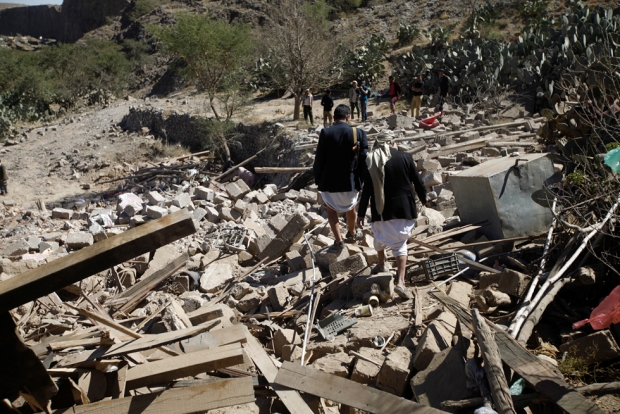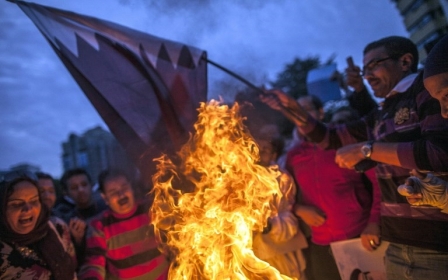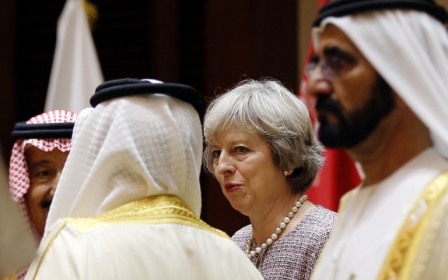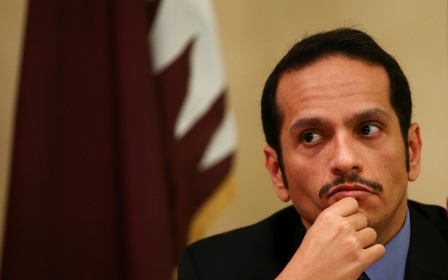ANALYSIS: A quandary for Qatar, and a global crisis in the making
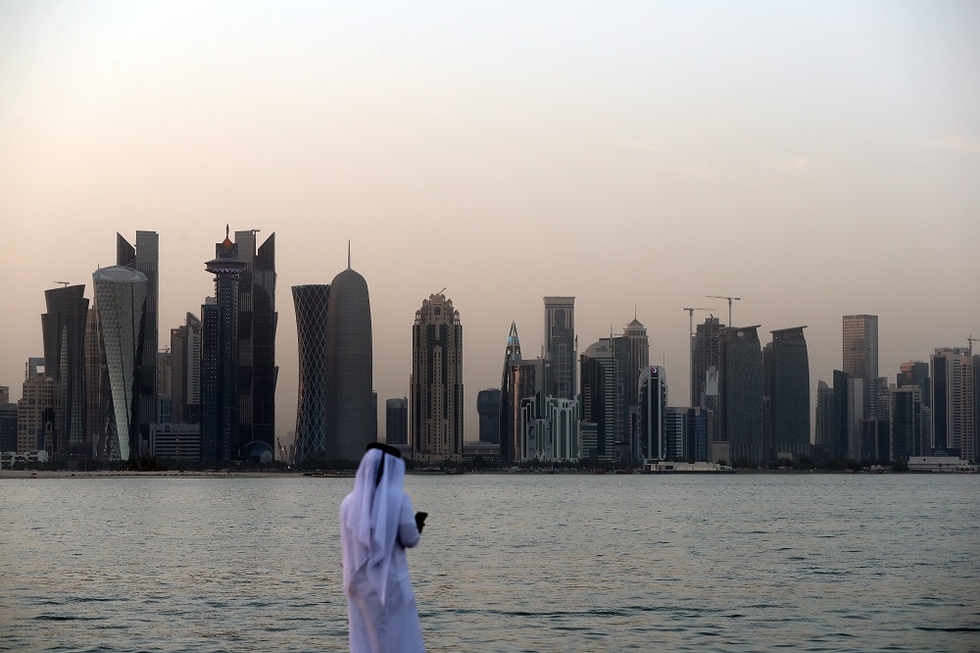
ISTANBUL, Turkey - The clock is ticking once again. Qatar has less than 24 hours to accept 13 demands a Saudi axis of powers says must be fulfilled to end a blockade.
The original deadline was extended by 48 hours on Sunday evening - but at midnight on Tuesday time runs out once again, leaving the Gulf region on the brink of an economic catastrophe and, as many have mooted, yet another military conflict.
Analysts have told Middle East Eye that the continued insistence by the Saudi bloc that Qatar must abide by its demands, and Doha's refusal, has potential to drag not just Qatar and its neighbours, but their neighbours and even states beyond the Middle East into crisis.
- The Saudi bloc's list of demands includes closing down media networks, cutting ties with Iran, shutting a Turkish military base in Qatar and submitting audits to the Saudis and Emiratis.
- The Saudi bloc has also demanded compensation for perceived harm caused by Qatari foreign policy - but not what the amount should be.
- Many analysts deemed the list as reducing the tiny gas-rich country into a vassal state of the Saudis and the UAE.
Qatar rejected the demands made by Saudi Arabia, the UAE, Bahrain and Egypt on the eve of the Sunday deadline. It did so again on Monday, after the Saudi bloc granted a 48-hour extension at the behest of mediator Kuwait.
But experts warn that at stake is much more than a mere squabble among various wealthy Gulf states.
"The potential for all this to spiral into regional chaos, even war, is huge," said Mensur Akgun, a professor and chair of the international relations department at Istanbul's Kultur University.
"Not even the Saudis would want that. Whichever way you look at it, this could end up quickly dragging Turkey and Iran into it with unpredictable outcomes."
Halil Recber, an economist, told MEE that the vague nature of the demands made them hard to accept.
"No one knows what compensation sums are mentioned," he said.
"But if the Qataris are saying they are prepared for war rather than accepting them, then we can only assume those demands must be unacceptable."
He said the global economy stood to suffer if the row was not resolved, as major countries were still in recovery from the global crisis of 2008.
"Right now, the price of oil is on an upward trend. They had bottomed out at about $42 but now it is already back in the $55 range," he said.
But that figure is only about a third of prices paid in 2008.
"Natural gas prices, which tend to stay stable, are on an upward trend only because it is Qatar, the biggest natural gas player in the market.
"All this affects various economic co-relations and developing economies will also be hard hit," he said.
The economic impact has already hit Qatar's riyal, as foreign exchanges and banks pull the currency from trading and the price against the dollar fluctuates for the first time since it was pegged in 2001.
The shock of energy and currency fluctuations could also hit Saudi Arabia, which is already facing a huge budget deficit.
According to Reuters, net foreign assets at Saudi Arabia's central bank, a measure of its ability to support its currency, have fallen from $737bn in August 2014 to $529bn at the end of 2016 as the government liquidated assets to cover the deficit.
The risk of war
But behind the more immediate effects of economic war lies the very real possibility of armed conflict. Ilker Basbug, a former Turkish chief of staff, said the deployment of Turkish troops to Qatar was a “risk” since he believed the Qatar crisis was part of a broader US move to confront Iran.
"In the past Turkey has taken on military roles across the world within UN Security Council mandates. We can have a military unit in Qatar for the purposes of training. But if you talk about combat troops, you are speaking of something entirely different,” Basbug told local broadcaster Haberturk.
The Turkish military presence is there precisely to prevent any attempt at toppling the current Qatari leadership
- Mensur Akgun, international relations expert at Kultur University, Turkey
"The United States has its biggest Middle East base right next to the [Turkish] military base. Whose side is the US on? Are the US and Turkey on the same page when it comes to Qatar? Does that not pose a risk?"
Akgun said Turkish soldiers in Doha were there to prevent a palace coup, a worst-case scenario but also a distinct possibility.
"The Turkish military presence is there precisely to prevent any attempt at toppling the current Qatari leadership," he said. "The Turkish military strength in Qatar is nowhere near enough to prevent an invasion."
There are just over 100 Turkish soldiers in Qatar, which could rise to about 700 as per terms of a co-operation agreement. The Turkish base however has capacity to hold up to 5,000 troops but that is inclusive of local troops being trained.
Compromise
According to Akgun, the Saudi-led block and Qatar would have to compromise in the end because the only other alternative would be a long-running stalemate as both sides have the financial means to withstand a drawn-out standoff.
"The Saudis are unlikely to attempt a Saddam-style invasion of Kuwait against Qatar if their demands are rejected. First of all, they won't have American backing for that, and even if any is promised they will be aware that Donald Trump might not be in power for very long," said Akgun.
A political resolution is vital, according to Akgun, who said the Saudi aim is to pile the pressure on Qatar but that realistically both sides were open to negotiation.
"The failure to reach a political resolution could have immense regional ramifications. It would be difficult to keep Turkey and Iran out of the picture and that picture could possibly even include war," said Akgun.
"The Saudis are already struggling militarily in Yemen."
The Saudis have been pushing a more militaristic and expansionist line ever since the rise of Mohammed bin Salman, who was promoted to crown prince on 21 June in place of Mohammed bin Nayef.
Iran, which shares its South Pars natural gas field with Qatar, and following its own regional expansionist policy, is unlikely to idly stand by and watch its US-backed arch regional foe Saudi Arabia attempt to threaten a vital revenue source.
What could eventually push Turkey, Iran and Qatar into an alliance would be existential angst in Tehran and Ankara that they will be next if the Trump-backed Saudis and Emiratis are allowed to have their way in Qatar.
Akgun said all eyes and hopes would turn on the mediators now.
"We can only hope that Kuwait, Oman, and even perhaps Turkey, manage to calm if not resolve this standoff between the Saudi camp and Qatar. Otherwise the region and world could be faced with a grim picture."
Middle East Eye propose une couverture et une analyse indépendantes et incomparables du Moyen-Orient, de l’Afrique du Nord et d’autres régions du monde. Pour en savoir plus sur la reprise de ce contenu et les frais qui s’appliquent, veuillez remplir ce formulaire [en anglais]. Pour en savoir plus sur MEE, cliquez ici [en anglais].


